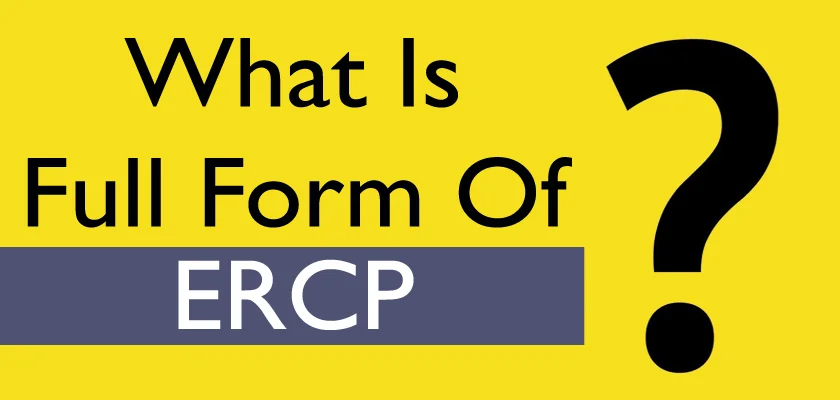Do you know what is the ERCP Full Form? Endoscopic Retrograde Cholangio Pancreatography is a specialized medical procedure used to diagnose and treat conditions in the bile ducts and pancreas. Learn about the benefits, risks, and procedures of ERCP and how it can help you.
Table of Contents
What is the ERCP Full Form?
ERCP Full Form: Endoscopic Retrograde Cholangio Pancreatography.
- E- Endoscopic
- R- Retrograde
- C- Cholangio
- P- Pancreatography
What is the ERCP Procedure?
The full form of ERCP test stands for Endoscopic Retrograde Cholangio Pancreatography. It is a medical procedure used to diagnose and treat problems in the liver, gallbladder, bile ducts, and pancreas.
Following is the ERCP procedure conducted by the doctors:
The procedure combines the use of endoscopy and x-ray imaging. A thin, flexible tube called an endoscope is inserted through the mouth and into the stomach and small intestine.
Dye is then injected through the endoscope, which allows the x-ray images to show any problems in the bile ducts or pancreas.
In some cases, small tools may be used through the endoscope to remove gallstones or other blockages. ERCP is used to diagnose and treat conditions such as gallstones, bile duct strictures, and pancreatitis.
Why do I need ERCP Test?
ERCP may be recommended for a number of reasons. Some common indications for the procedure include:
- Suspected gallstones: ERCP can be used to diagnose gallstones and remove them if they are causing symptoms such as abdominal pain or jaundice.
- Bile duct blockages: ERCP can be used to diagnose and treat blockages in the bile ducts that may be caused by gallstones, tumours, or other conditions.
- Pancreatitis: ERCP can be used to diagnose and treat issues with the pancreas, such as inflammation or blockages.
- Cancer: ERCP can be used to diagnose and stage certain types of cancer, such as cancer of the pancreas or bile ducts.
- Diagnosis: ERCP can be used to diagnose conditions such as chronic pancreatitis and sphincter Oddi dysfunction.
It’s important to note that ERCP is not always the best test for these conditions and your doctor will consider other factors before recommending it, such as your symptoms, medical history, and other test results.
Some Limitations in ERCP Procedure
ERCP is generally considered safe, but as with any medical procedure, there are risks involved. The most common risks include bleeding, infection, and injury to the pancreas. In rare cases, ERCP can also cause a tear in the bile duct or pancreas, which can be life-threatening.
Additionally, it is important to be aware of the amount of radiation used during the test and to consider the cumulative effects of any previous radiation exposure. If you are pregnant or think you may be, it is important to let your healthcare provider know as radiation exposure during pregnancy can be harmful to the developing fetus. It is also important to keep track of all X-rays you have received and to share this information with your healthcare provider.
When you may not be able to get ERCP, if:
There are certain situations in which an ERCP may not be recommended or possible. These include:
- If a person has had gastrointestinal (GI) surgery that has blocked the ducts of the biliary tree, the procedure may not be able to be performed.
- If a person has pouches in their esophageal (esophageal diverticula) or another abnormal anatomy that makes the test difficult to perform.
- If a person has recently had a barium procedure and still has barium in their intestines, this may interfere with the ERCP and make it difficult to get accurate results.
- If a person has a bleeding disorder or is on blood-thinning medication.
- If a person has a severe respiratory disease or has a history of difficult intubation.
- If a person has an allergy to the contrast dye used in the procedure, the procedure may not be performed.
- If a person has a severe heart or kidney disease.
- If a person is pregnant, the procedure may be delayed until after delivery.
It’s important to note that each case is different and the risks will depend on the individual’s condition. You need to discuss any concerns with your healthcare provider before the procedure.
What is the procedure before the ERCP
Before an ERCP, a patient typically undergoes a number of diagnostic tests and assessments, including blood work, an X-ray or other imaging test, and possibly a stool test.
The patient should also inform the doctor of any medications they are taking, as well as any allergies they may have.
The patient should also refrain from eating or drinking anything for at least six hours before the procedure.
Additionally, the patient will be given a sedative and anaesthetic to help them relax and not feel pain during the procedure.
What is the procedure after the ERCP
After ERCP, the patient will usually be monitored for a short time in the recovery area to make sure they are stable and there are no complications.
The patient may feel some discomfort or bloating in the abdominal area, and may also experience nausea or vomiting. To help ease these symptoms, the doctor will suggest the patient rest and avoid heavy meals or drinking for a few days. The patient will be given medicine to help with the pain or discomfort.
It is important for the patient to inform the doctor if they experience severe or worsening symptoms such as severe abdominal pain, fever or difficulty in breathing, as these may be signs of complications.
The patient will also be given instructions on what to do at home and when to contact their doctor. In some cases, additional imaging tests may be ordered to follow up on the ERCP results.
Note- It is important to note that recovery time can vary on a case-by-case basis, and the patient should follow their doctor’s instructions and recommendations.

FAQs- What Is The Full Form of ERCP?
What is the ERCP Full Form in Medical?
In Medical, the full form of ERCP stands for Endoscopic Retrograde Cholangio Pancreatography.
What is diagnosed in ERCP?
ERCP treats treating problems of the liver, gallbladder, bile ducts, and pancreas.
What is the ERCP Test Full Form in Hindi?
In Hindi, the ERCP Test Full Form stands for एंडोस्कोपिक रेट्रोग्रेड चोलैंगियो पैनक्रिएटोग्राफी.
Thanks for reading What is the ERCP Full Form? Bookmark our website Whatisfullform.com to know or read our collection of full forms.


